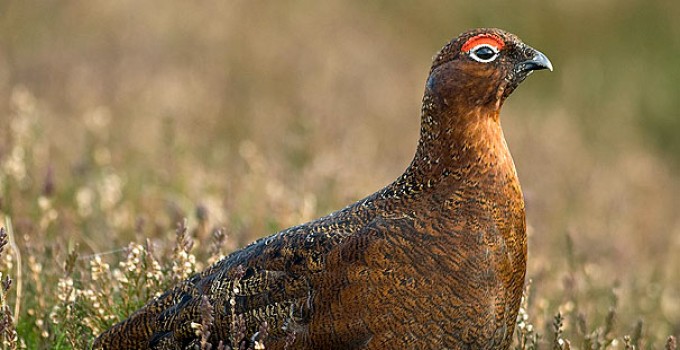The country’s largest corporate landowner, United Utilities, announced last week, just days before the start of the shooting season, that it will not renew shooting licenses on its land. One of the many catastrophic consequences of this decision is that it will dramatically increase the risk of wild fires. The Telegraph has more.
“I dread to think what will happen if we are not here,” Andrew Chadwick said as he looked out across the purple and green patchwork of moorland he manages. “It’s a disaster waiting to happen.”
He has been a gamekeeper in the Peak District for the last 37 years, just as his father was before him. But his post could soon be lost as the water company that owns the land is effectively banning shooting.
United Utilities (UU), the country’s largest corporate landowner, announced just weeks before Saturday’s Glorious Twelfth that it will not be renewing shooting licences on its land.
The company has in recent years focused on rewilding, and it has said it will allow it to “accelerate the restoration and rewetting of our peatlands”.
“I just don’t think that the people who have made this decision know what we do up here or understand the moors,” Mr. Chadwick said. “I think that they will regret the decision.”
This week he has been counting the grouse on Peak Naze moor, near the town of Glossop, using a pack of English setters who race through the heather to sniff out the cubbies.
On a good year, the syndicate that leases the moor can get six days shooting. They count the numbers so that they can ensure that breeding pairs and a healthy population survives the season.
Because the numbers are low, largely due to the heatwave early in the season which killed off their food, the syndicate will only get one day’s shooting this year.
But Mr Chadwick will still manage the moor for the other 364 days, on call day and night.
“I either wanted to play for Manchester United or become a gamekeeper, it was my dream job,” he jokes.
His tasks include cutting the heather to create patches which both act as a firebreak and create a habitat for the birds. He monitors pests and disease and – where necessary – removes heather to stop the spread and controls predators and vermin, including foxes.
As a result of the management, birds including curlews, peregrine falcons, lapwing, golden plover, oystercatchers and marlin are thriving, and the moor is among the top in the country for bird conservation.
David Naylor, the neighbouring farmer who grazes his sheep on the Peak Naze, said that he has seen subsidies for conservation come and go. When he took over the farm in 1988 there was money available for restoring the heather and an insistence on controlled burning, which is now all but banned.
“Rewilding seems to be the latest fashion, but there is no common sense in it at all,” he told the Telegraph. “People always seem to be chasing the latest subsidies. Between us tenant grazers who keep stock on the moors and the shooting people we keep the balance.
“There have been generations of work to get the moors to where they are now. By the time they realise what a foolish carry-on rewilding is it could take years – generations – to get it back. If you can get it back.
“It is supposed to be about conservation, but the birds will disappear, the sheep will disappear. All they will rewild is vermin and within five years there will be a big fire up there.”
Fire prevention is one of Mr Chadwick’s main roles, reported shoot tenant Richard May, a local farmer, who said that in the summer he prays every night when he goes to bed that the moor will not be set ablaze.
He has had a lease to shoot on Peak Naze since 2009. Since then, there has not been a single fire. By comparison, two neighbouring moors not managed for shooting have seen 13 fires over the same period.
As we stood on the peak, the edge of the shoot’s two and a half thousand acres dominates most of the horizon, and in the distance to the west you can see the skyscrapers of Manchester.
Also visible is Saddleworth Moor, where a fire in 2018 burned for three weeks, saw parts of Manchester evacuated and released half a million tons of carbon from the peat.
Researchers from the University of Leeds have since estimated that it exposed 4.5 million people across the northwest of England to dangerous levels of pollution and will increase premature deaths by 165%.
Worth reading in full.












To join in with the discussion please make a donation to The Daily Sceptic.
Profanity and abuse will be removed and may lead to a permanent ban.
Its never about what they say it is, its always something else, and its unfortuanately always connected to power and money.
There is always an incentive to a commercial decision which can be part of a long term agenda, and as you say, it is most probably the change of use aims that could be driving this. A wild fire would be a perfect land clearance event for the environmentally sympathetic installation of a solar farm, plus a little bit of heather to break up the landscape.
Many years ago I was told by an old boy that there are no wild animals in the countryside to fear, the most dangerous animal that you need to be careful of, or may see in the countryside is a townie.
The land they are talking about is in the Peak District National Park, so it wont just get plastered with solar panels. Its wokey vs wokey if thats the case.
Keith Starmer will already have a plan to deal with that problem.
Why does a company, whose business is selling water services, own moorland?
Its land that drains into a series of reservoirs.
Anyway, like cow farts, there is no nuance, and no common sense being applied, just ‘This thing is Bad, ban it.!’ They don’t consider the 2nd or 3rd order consequences of anything. They are like little children, particularly stupid little children. Then when the fires come, as they must, it will all be about Climate emergency, not management incompetance. Same situation where they stopped dredging rivers to save some kind of newt or fly, and 10 years later we get terrible flooding. All so predictable….
So if rain falls on land they don’t own the water won’t go into aquifers, rivers and reservoirs?
If there is a disaster UU and the rest of “then” won’t regret it a bit. A disaster is good because they can catastrophes it and blame global warming. Any damage will happen to little people who are probably racism, ignorant, Brexit voting gammons.
We know what happens next, because it is happening all over the country.
GWCT Berwyn
Three hopes:
Proportional representation to allow the creation of a powerful countryside party in this country, as in France where hunting is still legal, hunt saboteurs are arrested.
Move to France
Bob Hope and he is no longer with us…..
But everybody knows the moorland bird numbers have dropped due to climate change too subtle to show up in the meteorological records. And pesticides. And the hen harrier numbers will have dropped because out-of-work game keepers keep shooting them out of spite. Reintroducing eagles and a few wolves will soon sort it out.
Very well said. I see the lunatic Monbiot is today recommending lynx and wolves to sort out the deer population……
He must have been on one of those space trips…..
“Somebody get that child out of here!” (Neddy Seagoon)
Wildfires in the UK? Are you completely insane?
Perfect drought conditions with 85 mph winds in Hawaii. Geoengineering. If anyone thinks this was a “natural” disaster, they should have their heads examined.